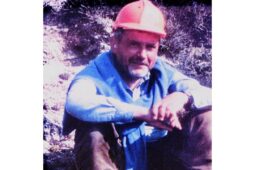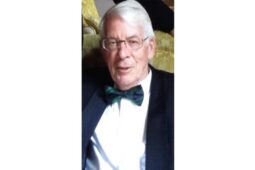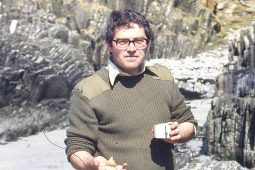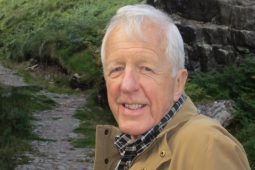Peter Friend (1934-2025)
An influential field sedimentologist, active in areas from the Arctic to India.
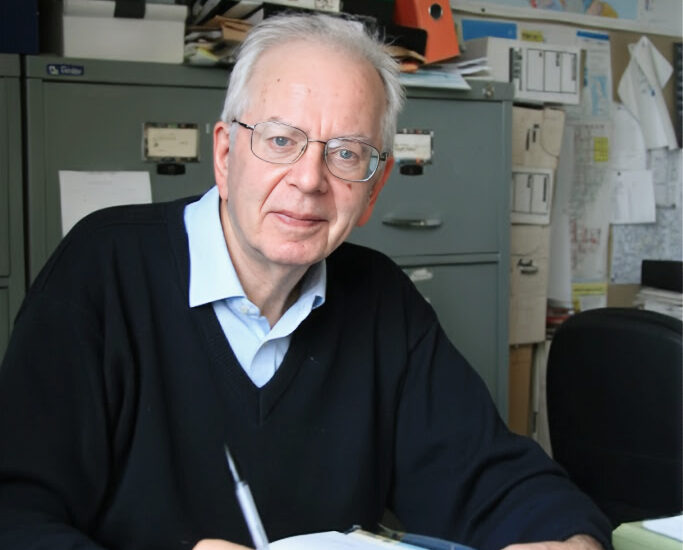
Peter Friend (© Helen Friend)
Peter was born in Edinburgh to Greville and Mary Friend. After wartime evacuation to Peebles, Peter went to Edinburgh Academy where his interest in geology developed. However, university study was delayed by National Service with the Royal Engineers in Worcestershire in the early 1950s.
Field focus
In 1954, Peter went to Gonville and Caius College, Cambridge, to read Natural Sciences. In his second year, he joined the 1955 Spitsbergen Expedition, Svalbard, run by his Director of Studies, Brian Harland. This trip proved to be seminal to Peter’s geological career. After graduating in 1957, Peter embarked on a PhD project studying the Devonian rocks of northern Spitsbergen, during which he took part in a further five research expeditions.
Upon completing the PhD, Peter joined the Scott Polar Research Institute and concurrently helped to run the University of Cambridge’s annual Arran field course, the first of numerous teaching trips that he was to lead. His early published papers were all on the non-marine Devonian of Arran (1963-70), New York’s Catskill Mountains (1966-67), Spitsbergen (1967-74) and East Greenland (1970-78).
Spain and the Himalayan foothills
From the late 1970s to 1990s, Peter pursued an interest in the Cenozoic basins of north-east Spain, supported by a succession of students. In all, Peter supervised over 30 students in the UK, Antarctica, Siberia and Canada, working on non-marine clastics, carbonates, evaporites and volcaniclastics.
Into the 2000s, Peter conducted field studies of non-marine basins in the Himalayan foothills across both Pakistan and India, a project requiring both geological and diplomatic skills.
Peter’s citation rate continued to rise for decades, a testimony to the quality of his field-based studies
‘Retirement’ and awards
Peter nominally retired in 2001. His publication rate declined but his citation rate continued to rise for the next two decades, a testimony to the quality of Peter’s field-based studies. Retirement ended his highly regarded undergraduate lectures and small-group supervisions, although his meticulously prepared practical demonstrations survived for years.
During the earlier part of Peter’s ‘retirement’, he produced two Collins New Naturalist Library books on the geology and scenery of Southern England (2008) and Scotland (2012). Concurrently, he was a trustee of the Cambridge Arctic Shelf Programme (CASP), the geological research unit started by Harland. Peter served on the board of trustees for 25 years and was Chair for a decade through the noughties. His most prominent outreach role was as Secretary, then Chair, of Friends of the Sedgwick Museum, which promotes geology to a wider audience through lectures, publications and field trips.
Peter’s geological career was recognised with the Prestwich Medal of the Society in 2010, and in 2015 his Spitsbergen and Greenland research expeditions were rewarded with the Polar Medal, awarded by the late Queen. However, more important to Peter than medals was the warmth with which he was regarded by colleagues and friends. In the many tributes after his death, the most common adjectives to describe him are generous, humble, gentle and kind, a fitting epitaph indeed.
By Nigel Woodcock, advised by Helen Friend and the biographical notes of Gary Nichols et al. (2007)
Further reading
Friend, P. (2008) Southern England: The Geology and Scenery of Lowland England. Collins New Naturalist Library Book 108, Harper Collins Publishers, 416 pp.
Friend, P. (2012) Scotland. Collins New Naturalist Library Book 119, Harper Collins Publishers, 480 pp.
Nichols, G., Williams, E. and Paola, C. (2007) Sedimentary processes, environments and basins: a tribute to Peter Friend. In: Sedimentary Processes, Environments and Basins: A Tribute to Peter Friend. Special Publications of the International Association of Sedimentologists, 38 , 1–7.








